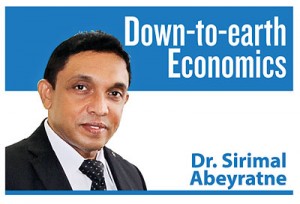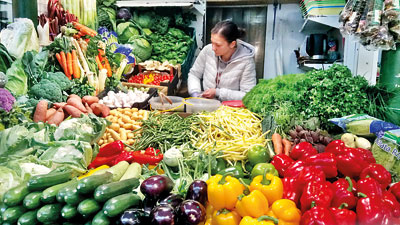Protection vs competition
View(s):One day during a television interview, the interviewer – Sonali, asked me a question: “If a foreign professional is allowed to practise in Sri Lanka, will it affect the income of our professionals? For instance, if my income as a lawyer is, say is Rs. 250,000 a month, an unemployed lawyer from another country comes here and offers the same service for a lesser amount, say Rs. 50,000; then would I lose my customers and my income? What is your response?”
I believe that Sonali being herself a lawyer didn’t ask this question for herself, but for the wider audience because it is a “national” question to many. I am certain that many who object to opening the economy for foreign professionals stand on this ground.
The argument is valid not only for foreign professionals, but also for producers whose produce is challenged by imported goods and services from foreign countries. This question leads me to bring out an important economic issue which I intend to focus on, today.
No rivals please!
The bottom line of the above question is “protection versus competition.” We don’t like competition, because it will threaten our “status” that we enjoy within our little “monopolies.” Instead, everyone likes some protection to safeguard our status and monopolies.
If you keep an eye on events and circumstances around you, you may find many trying to adopt defensive tactics to avoid competition and to secure their status.
Vendors on the street don’t want another creeping into their territory, because it would threaten their business. Tuk tuk drivers in a particular location form their own cartels to block any other three-wheeler entering there. A tuition master keeps trying to defend himself from another teacher by speaking and spreading “bad vibes” about the other. A private bus on the road, which adopts various tactics to collect maximum number of passengers awaiting for a bus doesn’t want another bus to overtake it. Even the beggars, begging at a junction don’t want to accept someone else joining them.
Why not others?
You may find many similar examples. All these examples show that “they want to keep it only for themselves” protected, avoiding competition. If that is the case everywhere, then why not the lawyers, the doctors, the professors, the technicians, the manufacturers and, any professionals alike?
But the question is “what is wrong with everyone puts up safeguards to defend their little monopolies?” Many of those who want to avoid competition also think that the government should support them to protect their territory against competition. Actually, some governments have done so adopting regulations and, then the countries have faced their long-term consequences.
Competition and Competitiveness
When there is no competition on any occasion or in any field, then the losers are the customers who don’t have a choice. The customer is subject to the terms and conditions imposed by the protected producers or professionals. The two main areas where the customer loses is quality and the price of the product or the service that the customer wants to buy.

File picture of a vegetable vendor in Poland where the vegetable market is very competitive.
When there is competition on any occasion or in any field, either the producers or the professionals have to improve the quality and the price constantly; otherwise customers who naturally and constantly look for these two – the quality and the price, will move away to other suppliers.
The improvement in the quality and the price is known as the “competitiveness.” Every producer and every professional regardless of the type of the task they perform should be engaged in improving their own competitiveness to remain “competitive” in their respective markets.
Competitiveness is the ability to compete; the ability of an individual or a nation to offer their products in better quality and competitive price. When everybody is engaged in improving their competitiveness, as individuals they compete better in the market and, as nations the countries grow and prosper.
Limited supply
I believe one of the important reasons for “sub-standard” professional services available for “over-crowded” markets is the lack of competition. When there are too many customers wanting to buy services from fewer professionals, it presents the worst case of protection.
We have seen a multitude of customers stay hours or days waiting to buy “sub-standard” and “high-priced” professional services from few professionals who have no inspiration to improve the “competitiveness”.
Many of us haven’t forgotten our good old days when we were waiting many years to get a telephone connection! It was a protected market kept for a government agency to take the customers for a ride providing sub-standard telephone connection at exorbitantly higher prices and call charges.
Thanks to the opening of the telecom service for competition, today we are competing with even developed countries in terms of the availability of telecom services, its high quality and low prices.
Competitiveness in global scale
Competitiveness of a country, according to a more formal economic definition, is described as a result of a set of institutions, policies and factors that determine the country’s level of productivity. The term “institutions” has a different meaning in economics; they are the “rules of the game” for any economic activity.
The competitiveness index compiled by the World Economic Forum is used to rank countries in the world and their progress. The top 10 countries with highest competitiveness are Switzerland, the US, Singapore, Netherlands, Germany, Hong Kong, Sweden, the UK, Japan, and Finland.
If you buy a product or a service in any of these countries, it is very unlikely that you would regret it. I am sure those who argue for “protection” including the politicians who promote it would also be happy to go for shopping in these countries.
In this ranking order of competitiveness in 138 countries, if you are looking for Sri Lanka’s position, it is 71; not even among the first half of the countries. It might be even surprising to you to notice that most of the countries in the second half are from Sub-Saharan Africa!
Government and the market
Many who argue against competition sometimes have a point to raise about the quality; what comes from abroad is lesser quality! Part of the macro-level answer is Sri Lanka’s competitiveness ranking position as explained above.
The second part of the answer is that there are two institutions to look after the quality issue. One is, obviously the market which sooner or later throws away the lesser quality products and services out of the business.
However, the market has its own limitations too. For certain products or services, it might take some time for the customers to realise that they are lesser quality. By that time, it might be too late for many. That’s why there is another institution to supplement the market failures or market delays; that’s the government.
Governments all over the world which adopt policy reforms also adopt regulatory mechanisms to expose their economies to “competition with the best” excluding the sub-standard.
Back to the question
I think the answer to Sonali’s question is clear now: If we have a regulatory mechanism enforced to screen, then any professional arriving to work in Sri Lanka should be a qualified professional. If he offers his service for Rs. 50,000, then there will be competition.
The local professional who supplied the same service for Rs. 250,000 is no longer able to exploit his customers who didn’t have a choice so far. The local professional will now have to think of improving the quality of his service and reducing the prices to remain in business.
There will be competition and, that competition will improve competitiveness of the products and services. It will not only serve the customers better, but also in aggregate form improve growth and prosperity of the country.
(The writer is a Professor of Economics at the Colombo University. He can be reached at sirimal@econ.cmb.ac.lk)


